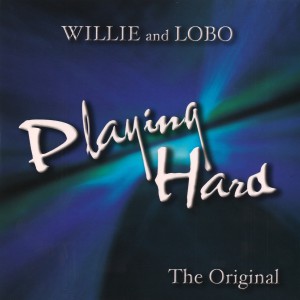We recorded PLAYING HARD in 1991 in Mamma Mia Restaurant, Puerto Vallarta, Jal Mexico. Originally it was a casette which was meant for selling from stage to support our surfing lifestyles in Mexico, but it was very successful and in one year we sold thousands of copies from the stage. Thus it drew attention from the record company and they awarded us with a record deal. Over the years lots of our die hard fans were requesting PLAYING HARD as a CD. Since we were under contract with various record labels we were unable to do that. Musically speaking, for me it’s the best recording we ever made. That’s why we decided after finishing two record deals to release it on our own for the 2011 tour. You might as well look at this recording as the birth of: Willie and Lobo. – Wolfgang “Lobo” Fink
Willie Royal was born in El Paso, Texas, as the son of an Air Force lieutenant colonel, and was raised in such exotic locales as Turkey, Germany, France, and Florida. He began his classical violin lessons at the age of eight, and became so proficient that he became concertmaster of his high school orchestra. Inspired by rock ‘n’ roll – as well as the violin-fueled fusion of Jean-Luc Ponty, Stephane Grappelli, and It’s A Beautiful Day – Royal rebelled against his formal training and started playing country-rock fiddle in a popular Florida-based band, while occasionally sitting in with Gregg Allman and Dickey Betts of the legendary Allman Brothers Band. Willie continued to absorb diverse musical styles – reggae, jazz, salsa – and soon set out on the road, playing in Europe, Canada, Brazil, and New Zealand, before settling in sunny Mexico in the early ’80s.
Wolfgang “Lobo” Fink was born in the tiny Bavarian village of Teisendorf, halfway around the world from his musical partner. The 18-year-old Lobo first picked up his chosen instrument while serving as a signalman in the German navy. After hearing an album by gypsy guitarist Manitas de Plata, the young mariner discovered his affinity for the romantic, rhythmic music. After completing his term of service, he searched out de Plata, ultimately finding the guitarist residing in a gypsy camp in Southern France. Lobo spent a year with de Plata and his people, hanging out and absorbing the music. Upon his return to Germany, Lobo formed Lailo, a flamenco group which toured Europe for three years and did much to popularize the modern gypsy sound. Longing for new ways to express himself, Lobo journeyed to the famous caves of Sacromonte in Grenada, Spain, to spend a year living and studying with the gypsies. In 1980, he headed to Mexico and began working as a solo act.
Willie and Lobo’s first fateful meeting came in 1983, when the two musicians were both working at Mamma Mia’s restaurant in the colonial town of San Miguel de Allende in Mexico. Willie was playing fiddle with a local salsa combo, while Lobo played solo flamenco guitar on the patio. Though they jammed occasionally, Willie and Lobo were still searching for their individual sound, recording a number of solo albums before finally uniting in 1990 in Puerto Vallarta.
They soon made a live recording of a swinging Willie and Lobo set, which they dubbed PLAYING HARD. Willie and Lobo’s increasing popularity and musicality led to their involvement in the soundtrack to the 1995 independent film, Shadow of the Pepper Tree. In addition, their music played a prominent role in the 1997 film, Fuochi d’artifico, produced by Vittorio and Rita Cecchi Gori (Il Postino, Mediterraneo, Johnny Stecchino), and was used as accompaniment by Ukrainian skater Yulia Lavrenchuk at the 1999 World Figure Skating Championships in Helsinki, Finland.




